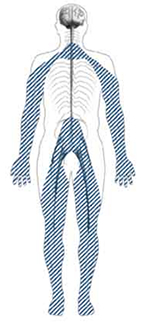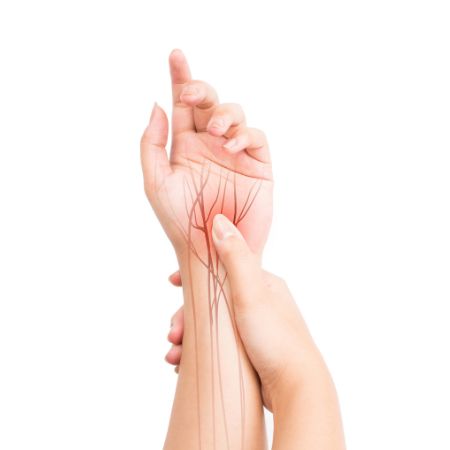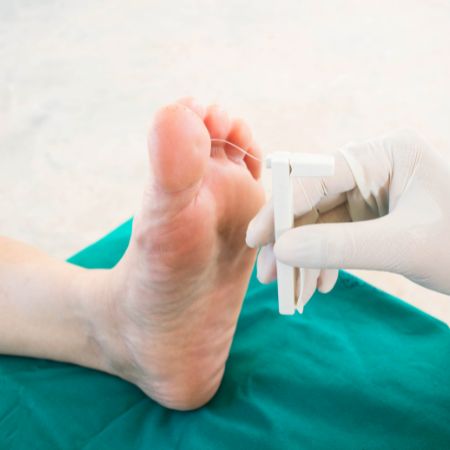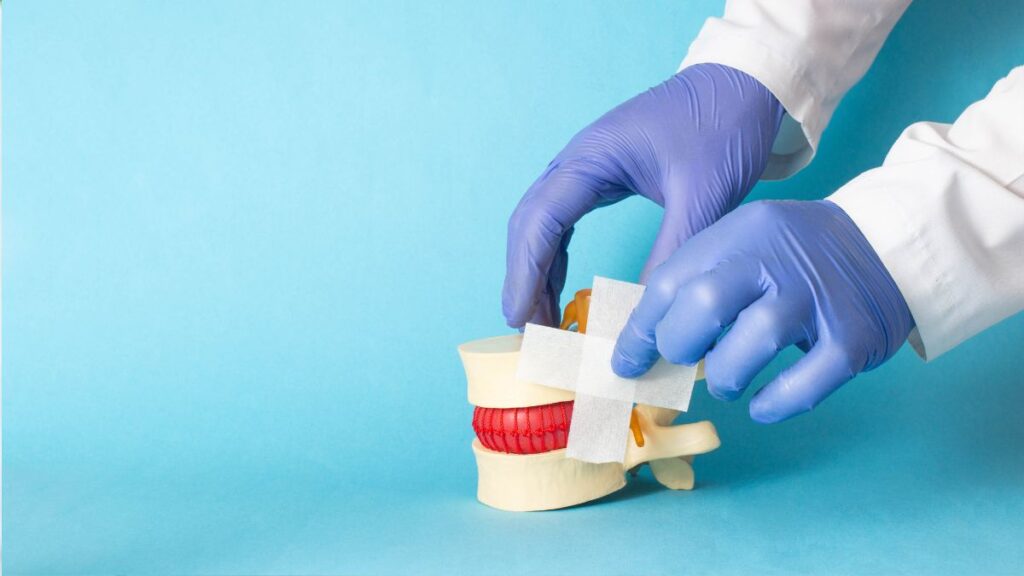Diabetic Nerve Pain Relief Chicago, IL
Home » Diabetic Nerve Pain
Peripheral neuropathy, the most common type of diabetic neuropathy, causes pain or loss of feeling in the toes, feet, legs, hands, and arms.
Peripheral neuropathy affects
- Toes
- Feet
- Legs
- Hands
- Arms

What is peripheral neuropathy
Peripheral neuropathy, also called distal symmetric neuropathy or sensorimotor neuropathy, is nerve damage in the arms and legs. Your feet and legs are likely to be affected before your hands and arms. Many people with diabetes have signs of neuropathy that a doctor could note but feel no symptoms themselves. Symptoms of peripheral neuropathy may include:
- Numbness or insensitivity to pain or temperature
- A tingling, burning, or prickling sensation
- Sharp pains or cramps
- Extreme sensitivity to touch, even light touch
- Loss of balance and coordination
These symptoms are often worse at night.
Peripheral neuropathy affects the nerves in your toes, feet, legs, hands, and arms.
Peripheral neuropathy may also cause muscle weakness and loss of reflexes, especially at the ankle, leading to changes in the way a person walks. Foot deformities, such as hammertoes and the collapse of the midfoot, may occur. Blisters and sores may appear on numb areas of the foot because pressure or injury goes unnoticed. If foot injuries are not treated promptly, the infection may spread to the bone, and the foot may then have to be amputated. Some experts estimate that half of all such amputations are preventable if minor problems are caught and treated in time.
How can I prevent diabetic neuropathies
The best way to prevent neuropathy is to keep your blood glucose levels as close to the normal range as possible. Maintaining safe blood glucose levels protects nerves throughout your body.

Experts recommend that people with diabetes have a comprehensive foot exam each year to check for peripheral neuropathy. People diagnosed with peripheral neuropathy need more frequent foot exams. A comprehensive foot exam assesses the skin, muscles, bones, circulation, and sensation of the feet. Your doctor may assess protective sensation or feeling in your feet by touching your foot with a nylon monofilament—similar to a bristle on a hairbrush—attached to a wand or by pricking your foot with a pin. People who cannot sense pressure from a pinprick or monofilament have lost protective sensation and are at risk for developing foot sores that may not heal properly. The doctor may also check temperature perception or use a tuning fork, which is more sensitive than touch pressure, to assess vibration perception.
Other tests for Diabetic Neuropathies in Chicago
The doctor may perform other tests as part of your diagnosis.
Nerve conduction studies or electromyography are sometimes used to help determine the type and extent of nerve damage. Nerve conduction studies check the transmission of electrical current through a nerve. Electromyography shows how well muscles respond to electrical signals transmitted by nearby nerves. These tests are rarely needed to diagnose neuropathy.
A check of heart rate variability shows how the heart responds to deep breathing and to changes in blood pressure and posture.
Ultrasound uses sound waves to produce an image of internal organs. An ultrasound of the bladder and other parts of the urinary tract, for example, can show how these organs preserve a normal structure and whether the bladder empties completely after urination.
How are diabetic neuropathies treated in Chicago
The first treatment step is to bring blood glucose levels within the normal range to help prevent further nerve damage. Blood glucose monitoring, meal planning, physical activity, and diabetes medicines or insulin will help control blood glucose levels. Symptoms may get worse when blood glucose is first brought under control, but over time, maintaining lower blood glucose levels helps lessen symptoms. Good blood glucose control may also help prevent or delay the onset of further problems. As scientists learn more about the underlying causes of neuropathy, new treatments may become available to help slow, prevent, or even reverse nerve damage.
As described in the following sections, additional treatment depends on the type of nerve problem and symptom. If you have problems with your feet, your doctor may refer you to a foot care specialist.
Pain Relief for diabetic neuropathies in Chicago
Doctors usually treat painful diabetic neuropathy with oral medications, although other types of treatments may help some people. People with severe nerve pain may benefit from a combination of medications or treatments. Talk with your health care provider about options for treating your neuropathy.
Medications used to help relieve diabetic nerve pain include:
tricyclic antidepressants, such as amitriptyline, imipramine, and desipramine (Norpramin, Pertofrane)
other types of antidepressants, such as duloxetine (Cymbalta), venlafaxine, bupropion (Wellbutrin), paroxetine (Paxil), and citalopram (Celexa)
anticonvulsants, such as pregabalin (Lyrica), gabapentin (Gabarone, Neurontin), carbamazepine, and lamotrigine (Lamictal)
opioids and opioid-like drugs, such as controlled-release oxycodone, an opioid; and tramadol (Ultram), an opioid that also acts as an antidepressant
Duloxetine and pregabalin are approved by the U.S. Food and Drug Administration specifically for treating painful diabetic peripheral neuropathy.

You do not have to be depressed for an antidepressant to help relieve your nerve pain. All medications have side effects, and some are not recommended for use in older adults or those with heart disease. Because over-the-counter pain medicines such as acetaminophen and ibuprofen may not work well for treating most nerve pain and can have serious side effects, some experts recommend avoiding these medications.
Treatments that are applied to the skin—typically to the feet—include capsaicin cream and lidocaine patches (Lidoderm, Lidopain). Studies suggest that nitrate sprays or patches for the feet may relieve pain. Studies of alpha-lipoic acid, an antioxidant, and evening primrose oil have shown that they can help relieve symptoms and may improve nerve function.
A device called a bed cradle can keep sheets and blankets from touching sensitive feet and legs. Acupuncture, biofeedback, or physical therapy may help relieve pain in some people. Treatments that involve electrical nerve stimulation, magnetic therapy, and laser or light therapy may be helpful but need further study. Researchers are also studying several new therapies in clinical trials.
If you’re suffering from diabetic neuropathies, don’t hesitate to contact pain management clinic in Chicago. Our team of specialists will work with you to create a treatment plan that helps ease your symptoms and improve your quality of life.




